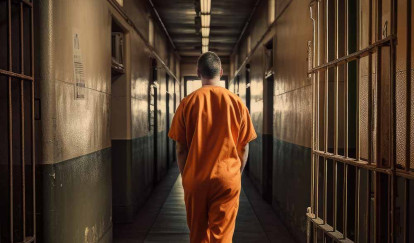
Share This Article
The difference between prisoners' privileges and rights is often sizable. Understanding what rights and privileges prisoners retain and which they may lose can be a tricky endeavor. Not every state restricts the same rights and privileges. And different facilities within the same state may follow different rules on restricting and granting prisoners' rights and privileges.
What's the Difference Between Prisoner Rights and Prisoner Privileges?
The main difference between prisoner rights and privileges is a legal distinction. Prisoners' rights are granted by law. Meanwhile, prisoner privileges are granted to individual inmates by the facility.
Facility staff may grant prisoner privileges to individual prisoners as a reward for good behavior and other positive efforts. Unlike a prisoner's rights, the facility's staff can revoke these privileges at any time.
Examples of prisoner privileges include access to inmate work and educational programs. Additional privileges may include the following:
- Participating in recreational activities
- Purchasing commissary items
- Communicating with friends and family
For example, in Virginia, inmates housed in a Department of Corrections (DOC) institute or a local jail can earn Good Time Awards under the following categories:
- Good Conduct Time
- Good Conduct Allowance
- Extraordinary Good Time
- Restoration of Lost Good Time
These Good Time Awards allow prisoners with good behavior and performance to earn up to 30 days of good time for every 30 days served. A Richmond prisoners' rights lawyer can answer your questions about this program and more.
The Basic Rights of Prisoners
The fundamental rights of prisoners are enshrined in American laws. However, these laws can be complicated. Throughout the U.S., laws pertaining to prisoners can be based on thousands of federal, state, local, and tribal systems.
The most straightforward way to approach prisoners' basic rights is to look at those granted by the Constitution. Prisoners do not retain their full constitutional rights. However, the Eighth Amendment in the Bill of Rights offers protection to prisoners.
The Eighth Amendment protects prisoners' rights by ensuring the state cannot impose excessive fines, excessive bail, or cruel and unusual punishment.
The Eighth Amendment to the Constitution was ratified in 1791. Since then, the Supreme Court and lower courts have interpreted additional meaning from it regarding the basic rights of prisoners. Additionally, laws have since been passed that provide certain rights to those in U.S. prison systems, including the following:
- The Americans with Disabilities Act (ADA)
- The Rehabilitation Act of 1973
- The Religious Land Use and Institutionalized Persons Act (RLUIPA)
- The Prison Rape Elimination Act (PREA)
Various amendments, interpretations, and acts have impacted prisoner rights, including humane conditions, access to mental health care, religious services, bail, and protections for disabled prisoners. A prisoners' rights lawyer can help you determine the rights you are legally entitled to.
Humane Conditions
In 2010, the Supreme Court reiterated that prison officials cannot deny inmates humane conditions of confinement if the facility official knows of and disregards an excessive risk to the prisoner's safety or health.
In Pitre v. Cain, the Court held that Pitre had a constitutional right to refuse unwanted medical treatment. Despite other questions of law, the prison officials would not be justified in coercing Pitre to take his medication or punishing him for not taking it. The officials displayed deliberate indifference when they subjected him to labor they knew posed a serious risk of harm to Pitre's health.
Access to Mental Health Care
Prisoners have a right to access mental health care. The Court established this in the landmark case, Estelle v. Gamble. The case established that a lack of medical care was unconstitutional when it led to unnecessary and malicious infliction of pain. The Court has since extended this holding to include mental illness.
In Bowring v. Godwin, the Court held that inmates have a right to psychiatric or psychological treatment if a health care provider concludes that:
- the symptoms suggest a serious malady,
- the malady can be cured or significantly alleviated, and
- delaying or denying care could cause the prisoner substantial harm.
Religious Services
The First Amendment protects Americans' religious rights, and this holds for prisoners. Congress passed the Religious Land Use and Institutionalized Persons Act (RLUIPA) to reinforce this right. A prison official cannot place a substantial burden on prisoners' ability to exercise their religion. This is true unless the official can prove a compelling interest to do so that they cannot achieve in a less restrictive manner.
Bail
The Eighth Amendment prohibits excessive bail. However, statutory provisions also provide a right to bail under certain circumstances. Nineteen states provide a broad constitutional right to bail that does not apply to capital offenses.
Twenty-two states have amended right-to-bail provisions to expand preventive detention. Many states list offenses or categories excluded under the right to bail. Usually, these offenses involve violence, sexual assault, or repeat offenses.
Nine states do not offer a constitutional right to bail. However, these states still protect against excessive bail. In practice, the bail process in these nine states often functions similarly to the twenty-two states with amended bail rights.
ADA Protections for Disabled Prisoners
Title II of the Americans with Disabilities Act (ADA) protects disabled prisoners.
For example, in Pennsylvania Department of Corrections v. Yeskey, the Department refused to allow Yeskey to participate in a motivational boot camp due to his history of hypertension. The Court held that no public organization might discriminate against capable disabled persons because of their disability. The Court also held that the ADA protected prison inmates the same as any other citizen.
What Rights Are Prisoners Not Allotted?
Prisoners in an American correctional facility or female facility retain rights that generally protect them from unnecessary or intentional bodily injury, physical injury, and emotional injury. They also retain the right not to be discriminated against for their national origin or religious beliefs. However, prisoners lose certain rights when they enter the prison system.
Examples of rights prisoners lose may include:
- The right to an expectation of privacy
- The right to free speech in certain aspects
- The right to vote
Some people ask why prisoners should be allowed to vote. Others claim that even those with an extensive criminal history should be allowed to vote after a reasonable time has passed since their incarceration. Currently, each state has its due process of law for determining prisoners' voting rights.
Hire an Attorney To Ensure Your Rights Are Protected
If you or a loved one have been imprisoned, it is essential to ensure your rights are protected throughout your sentence. The unconstitutional restriction of prisoners' rights does occur. The prisoners' rights lawyers at Commonwealth Law Group can answer your questions and help ensure your rights and privileges are protected.
If you have been injured at work or through the negligence of another individual or entity, contact us at (804) 999-9999 or or use the form below to connect with our legal team. We will fight to get you the justice you deserve.
